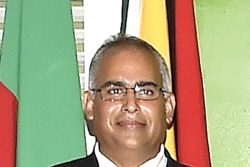One of the primary reasons (though not the only one) why we are now confronted by numerous longstanding law and order-related anomalies is almost certainly linked to the seeming elevation of the Guyana Police Force (GPF) above official criticism or vigorous reprimand and the serious pursuit of corrective action. One can think of no other reason why forms of police behaviour that pass for law-enforcement, but which are themselves blatant acts of lawlessness, are allowed to persist without the slightest hint of corrective intervention.
This is the third editorial published by the Stabroek News in as many weeks that points critical fingers at the Force. We can only say that the issues involved here are sufficiently important to the well-being of our country as to cause us to shrug off accusations of prejudice and to persist in the pursuit of corrective action.
Perhaps, in the fullness of time the President, the Minister of Home Affairs and the operational leadership of the Police Force will come to understand the extent of the self-inflicted damage that is being done to the Force on account of their inexplicable seeming reluctance to move with haste to apply the requisite corrective action.
Countries that lay claim to favouring stability and good order are, understandably, inclined to pay particular attention to the role that law enforcement plays in the pursuit of those objectives. This, manifestly, does not appear to apply to the Guyana Police Force. The stakes are much too high for those responsible for this anomaly to be afforded a ‘free pass’ here.
Mind you, we accept the right of the Police Force to criticize our perspectives on aspects of the extant law-enforcement policing regime. This, too, is important in a democratic society. What we seek, ideally, is a free, open and objective encounter. In which circumstance we doubt very much that charges of prejudice or any other form of ulterior motive will prevail.
Where, as is manifestly evidenced in the realm of law enforcement (and here traffic management and the policing of aspects thereof come immediately to mind) we have, as a country, been weighed and found considerably wanting. If we are to make real progress on the broader development front there can be no question than that the overburden of ‘dodgy’ dimensions that have come to be associated with policing will have to be left behind.
One of the very real dangers that confront Guyana at this time is the reality that our seeming ‘intoxication’ brought on by the sudden infusion of ‘oil wealth’ into the picture could, sooner rather than later, become the biggest threat to the social fabric of the society (there are those who would contend that this is, to a considerable extent, already the case) since there is no reason why, over time, Guyana cannot become afflicted by a circumstance in which its perceived ‘good fortune’ could not, over time, become a huge poisoned chalice.
What appears, overwhelmingly, to obtain in the realm of traffic management is a single-minded pursuit of greater material gain derived from undisguised shakedowns, a pursuit that ensues seemingly with scant regard to its effect on the ‘service and protection’ dimension of the Force. Here, the means through which the ‘returns’ are realized are entirely tangential to the objective of the ‘mission.’ There can be no question than that swathes of what the Police Force loosely describes as traffic management are no more than ‘feeding troughs’ designed solely for the purpose of affording corrupt traffic cops (and their reported alleged ‘handlers’ further up the food chain) are, by definition, altogether unmindful subsidies on their official compensations.
But that is not the extent of the disrepute into which rogue operators have brought the Force. Some would appear to have usurped the ‘right’ to determine the timbre of coastal night life by striking ‘dodgy’ deals with places of entertainment through which the accommodation of lawlessness can be traded for material gain. A story published in the Stabroek News of Monday September 11 (‘Eccles residents at wits’ end over noise nuisance’) chronicles the protestations of “residents of 3rd Avenue, Eccles,” who must endure excesses that include “severe traffic congestions, distressing incidents of indecent exposure by Bar patrons resorting to public areas such as road corners and residents’ fences to relieve themselves. Further, the residents have voiced their distress over the alarming sound of gunshots that erupt during rum shop brawls,” their overarching concern being over “the apparent inability of the Providence police to take action.”
The reality is that when police patrols are seemingly unable to rein in the raucous, sometimes dangerous ‘excesses’ that obtain at Bars operating in residential areas, the ineffectiveness of these patrols give altogether justifiable concerns as to whether those ‘limitations’ do not, in fact, have to do with the monopoly of influence wielded by Proprietors possessed of sufficient leverage to trump the law on account of having some of those responsible for administering the law ‘in their pockets.’
To continue to seek to provide the President, the Minister of Home Affairs and the Acting Commissioner of Police with informed briefings about the gaping holes (many of them seemingly relatively easily remediable) in public policing can hardly be reasonably interpreted as exercises that seek to degrade the Force. What these editorial disclosures seek to do is to provide reminders that, as things stand, the Force is, even now, being weighed and found to be considerably wanting. That has to change and the change has to come from the top.






